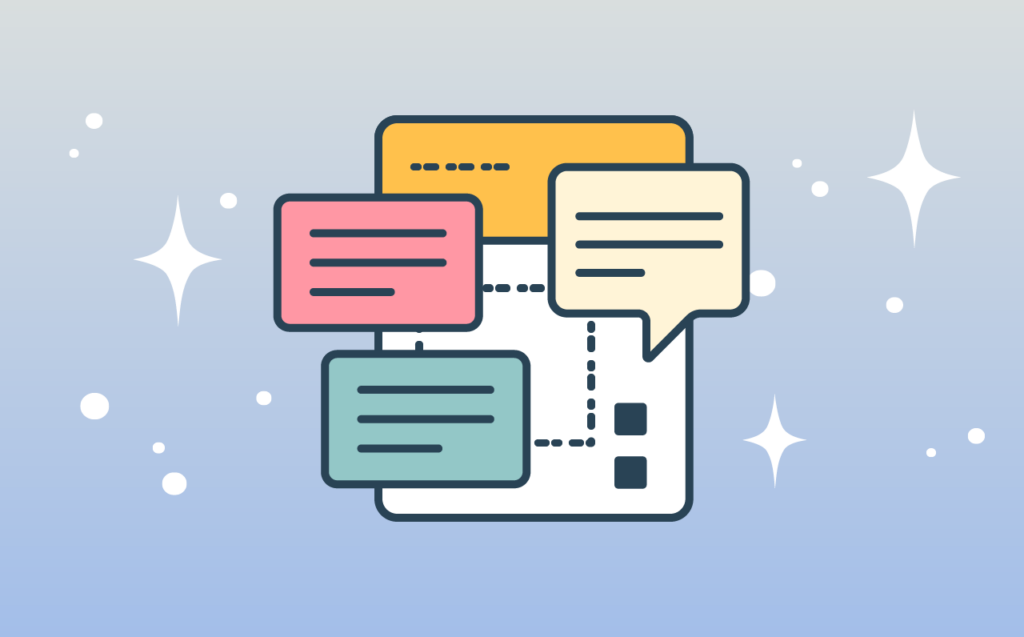Imagine a world where behavioral healthcare is less about shuffling papers or being stuck behind a desk, and more about engaging with clients in ways that truly matter. That’s the world behavioral health AI is shaping—one in which software automation expands and enhances the impact of effective care. As a leader in the space, Eleos is defining this tech category. Our goal? Making behavioral health treatment as efficient as it is empathetic—and creating an operational environment that empowers human clinicians to focus on what they do best: caring for others.
Intro to AI for Behavioral Health
To start, let’s define behavioral health AI, explain how it positively impacts behavioral health providers and their organizations, and discuss the most beneficial use cases for this type of technology.
What is behavioral health AI?
The Eleos behavioral health AI platform integrates care operations with agile software principles, enabling healthcare providers to automate tedious administrative tasks and thus, spend more time and energy on patient care. It’s like having an intelligent assistant dedicated to enhancing the efficiency and effectiveness of the entire patient journey.
“In the context of behavioral health, artificial intelligence can be used to automate the operational tasks and workflows involved in delivering care. There are many tasks that are inefficient for a clinician to perform—or just not the most effective use of their time—that behavioral health AI can handle for them.”
-Jennifer Gridley, Former VP of Marketing, Eleos
The Eleos AI platform, for example, offers a behavioral health-specific suite of tools designed to simplify care flows, foster collaboration among care teams, and make life better for both staff and clients.
Why is purpose-built AI important?
The treatment of behavioral health conditions presents a host of unique challenges, given the intricate blend of biological, psychological, and socio-environmental factors as well as the need for personalized, long-term care delivery. This is exactly why behavioral health AI is such a game-changer in the behavioral health field.
Applied across behavioral health, AI makes each of the following possible at scale—giving it the power to completely transform care delivery as we know it.
Efficiency: AI solutions cut documentation time by 70% or more while helping ensure adherence to compliance and billing standards. That means less time wasted creating (and potentially correcting) documentation, making more room for clinicians to focus on delivering the most effective care in the most efficient manner.
Care Quality: Tools that provide session intelligence and care delivery insights enable more informed decision-making, leading to better treatment strategies. They can also improve patient outcomes. In fact, research shows that clients whose therapists use Eleos achieve 3–4x better symptom improvement when compared to treatment as usual. Therapists using Eleos also delivered 35% more evidence-based techniques. All of this enables providers and organizations to collectively raise the bar on the standard of care.
Integrated Care: AI built for behavioral health streamlines patient journeys, supports care delivery programs such as the CCBHC model of care, and encourages cooperation and information-sharing across diverse care teams. This is crucial in the behavioral health field, where integrated care can greatly impact patient outcomes.
Continuous Improvement: AI platforms enable continuous evaluation and enhancement of care processes at scale. Consistent data tracking and analysis over time helps providers and supervisors identify improvement areas and implement changes swiftly.
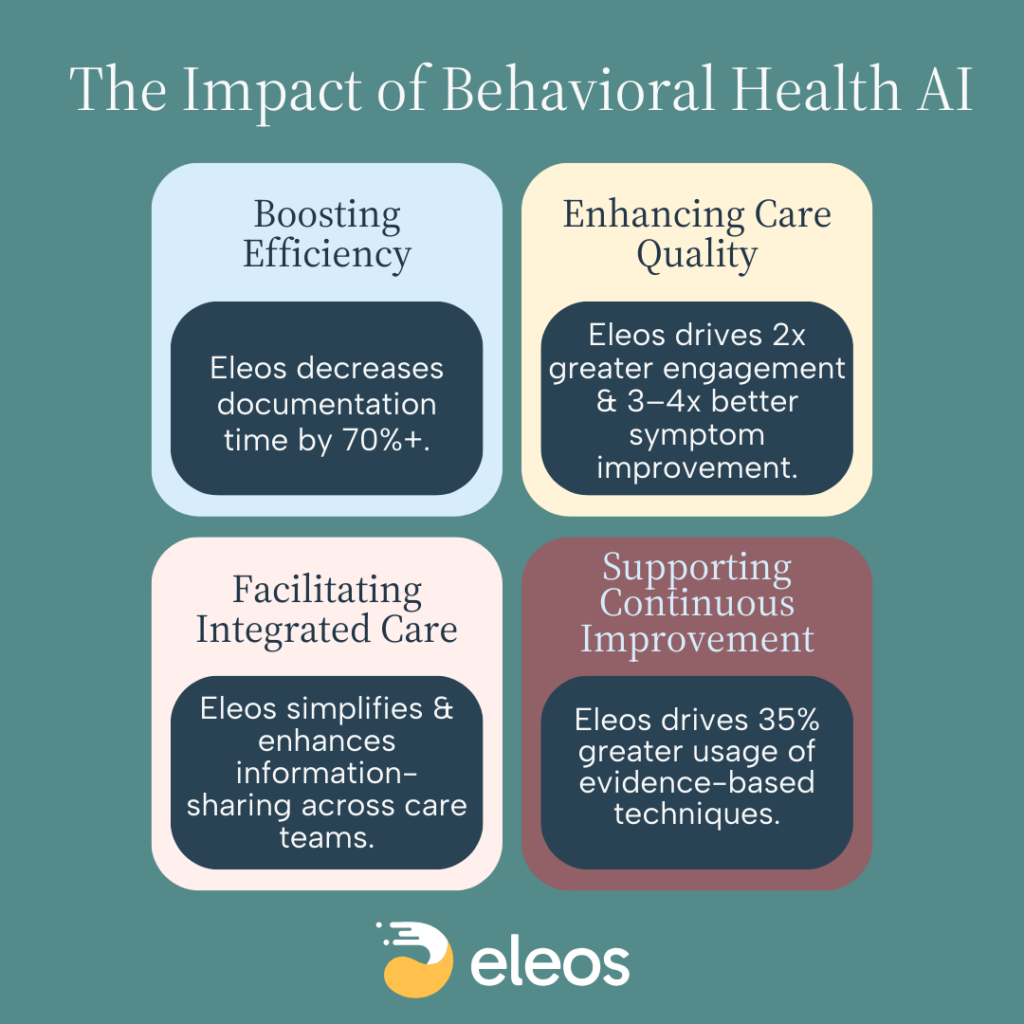
Who can use behavioral health AI?
A wide spectrum of behavioral healthcare professionals and entities can leverage AI tools and solutions, including:
Providers: Psychologists, counselors, therapists, and case managers can use behavioral health AI to reduce their administrative burden and improve the quality of care they deliver.
Institutions: Hospitals, clinics, and mental health facilities can use behavioral health AI to enhance the patient experience, attract and retain staff, and help ensure regulatory compliance.
Digital and Virtual Health Providers: Telemedicine and digital health platforms can leverage AI to provide high-quality care to users, irrespective of their location.
Managed Care Organizations and Health Insurers: These entities can use behavioral health AI to improve care coordination, ensure compliance with care standards, and manage health outcomes effectively.
AI solutions can be transformative across the entire behavioral health landscape, offering opportunities for enhanced efficiency, quality, and integration in care delivery. As the behavioral health AI space continues to evolve, it is poised to play an increasingly pivotal role in shaping the future of behavioral health.
Not sure where to start with behavioral health AI? You don’t have to figure it out alone. Check out our Complete Guide to Behavioral Health AI Implementation for a step-by-step look at what this process actually involves—from choosing a tool to preparing your team.
Eleos’ Approach to Specialized AI
At Eleos, AI is more than a buzzword: it’s the driving force behind our mission to revolutionize behavioral health. Our approach is anchored in our commitment to enabling providers to deliver efficient, patient-centered, and value-driven care—supported by a combination of clinical expertise and advanced technology.
As we push the boundaries of modern technology to meet evolving healthcare demands, these are the core pillars supporting our model:
Clinical Expertise: Serving as the bedrock of our solutions, our team of clinical experts work collaboratively with customers to help ensure that our behavioral health AI tools are tailored to meet the unique demands of behavioral health, championing personalized and empathetic care.
“For any technology that leverages AI models, effectively training the models to perform with a high degree of accuracy is critical. For a model specific to behavioral health, that level of training is only possible with input from clinical experts—which is why our clinical team is a core differentiator for us at Eleos. Furthermore, the overall effectiveness of the model hinges on the quality of the data used to train it. By training our models with real-world session data, we enhance their applicability in the intended context: community-based behavioral health clinics.”
– Shiri Sadeh-Sharvit, PhD, Former Chief Clinical Officer, Eleos
Technology-Driven Efficiency: Leveraging advanced AI and Machine Learning (ML), we improve efficiency and provide actionable insights with tools ranging from documentation management and compliance review to evidence-based-care feedback. Plus, our intuitive technology embeds directly into existing workflows (i.e., on top of the EHR), thus simplifying implementation and supporting quick user adoption.
Integrated Care Coordination: We bridge existing gaps in patient care by fostering seamless coordination across diverse care stages and providers, ultimately improving patient outcomes.
Agile and Iterative Improvement: The tech community is known for quickly pivoting to meet user needs—and we certainly hold tight to that principle in support of our customers. Our solutions are designed to be adaptive and always-evolving, accounting for user feedback and leveraging data-driven insights to continuously drive value for the providers who rely on us.
Robust Compliance and Security: There’s nothing more important than securing patient data and adhering to healthcare regulations. Our behavioral health AI solutions are developed in compliance with all relevant regulations, and we prioritize robust security measures to protect patient information.
How do Eleos solutions maintain data security and protect patient information?
Protecting private client information is a non-negotiable in behavioral healthcare, so it’s also non-negotiable in how Eleos functions. Security measures are built into every aspect of our behavioral health AI platform to help foster trust between clients and providers.
Eleos uses end-to-end encryption to safeguard data in transit and at rest. All session data is stored in the United States. We meet leading security and privacy standards, including HIPAA, SOC 2, and ISO 27001, 27799, and 42001. Single Sign-On (SSO) controls are in place to support secure user access.
We do not store raw session recordings or use protected health information (PHI) to train our AI models. If data is retained to improve the system, it is fully de-identified and reviewed only by a clinically licensed, security-cleared team. Access to this data is tightly restricted.
Eleos also undergoes regular third-party audits and annual penetration testing to identify and address potential risks. We require our vendors and partners to meet the same high standards.
These protections keep sensitive information secure and help providers work with confidence that their tools align with client privacy expectations.
Want to learn more about our security practices at Eleos? Grab your copy of the Ultimate Guide to Behavioral Health AI Security & Privacy.
Eleos’ Behavioral Health AI Functions: The Core Trio
Our purpose-built AI platform centers on three fundamental pillars:
- Documentation Automation
- Session Intelligence and Leadership Reporting
- Compliance Automation
Working in concert, these core components empower providers to transform care delivery, build stronger client-provider relationships, and help ensure steadfast compliance in the dynamic realm of behavioral healthcare.
Streamline Paperwork with Documentation Automation
Administrative demands in behavioral healthcare—especially documentation—place a heavy burden on providers. There’s ever-increasing pressure to maintain comprehensive, accurate records while simultaneously providing quality care.
“Paperwork overload” is a real stressor, and when you add it to the emotional demands that come with working in behavioral health, it’s no surprise that clinician burnout is a growing issue in this field—and a serious threat to the effectiveness and sustainability of the entire healthcare system. Behavioral health AI can make a significant impact in this area by automating some of the most time-consuming parts of the note-writing process.
See how GRAND Mental Health used Eleos to save 2.5 months of staff time in 6 months. Read the case study.
How does behavioral health AI software generate progress notes automatically?
From the clinician’s perspective, this process is straightforward. Once a session is over, the clinician clicks to end the session. The AI-powered documentation system takes roughly two minutes to analyze the session data. A short while later, suggested entries for the progress note appear, divided into categories such as data, trends, key moments, interventions, assessment, and plan. The clinician then chooses which generated suggestions to include, adds any edits or details, and submits the final note—cutting down significantly on manual data entry.
Does AI support any other note types?
In addition to progress notes, AI has expanded to support intake assessments and treatment planning. With ambient listening, Eleos helps clinicians capture biopsychosocial assessments—during patient intake and at various intervals throughout care—and generate comprehensive suggestions for 19 of the most common fields, including mental health & medical history, risk assessment, content aligned with ASAM Criteria, strengths/barriers, and more.
Then, during treatment planning, Eleos captures the conversation and organizes what’s discussed into clear, reviewable suggestions for common treatment plan fields, including presenting problems, treatment goals, interventions or services, SMART measurable objectives, and risk and crisis plans. That way, clinicians are able to stay present with their clients and work more collaboratively with them on their care plan.
How does the AI technology behind automated documentation work?
From a technical perspective, there’s a lot that goes into making sure that progress notes are accurate, relevant, compliant, and personalized. At the heart of this advanced system are AI and Natural Language Understanding (NLU) models—specifically those that have been trained with a massive amount of real-world behavioral health data.
The process begins with Automatic Speech Recognition (ASR), which converts spoken language into written text. Eleos uses ASR to process therapy session recordings into text, which is then further analyzed using Natural Language Processing (NLP) models that convert the raw transcript into progress notes and session insights.
Beyond simple transcription, Eleos leverages NLU to interpret the meaning of individual conversations, which it then uses to draft unique, concise progress notes that focus on essential details while excluding irrelevant information. The system evaluates the session to identify key discussions, the frequency of specific topics, the ratio of dialogue between patient and provider, and even the use of evidence-based techniques.
For a deep dive into how Eleos ensures note quality and accuracy, check out this article by a member of our data science team.
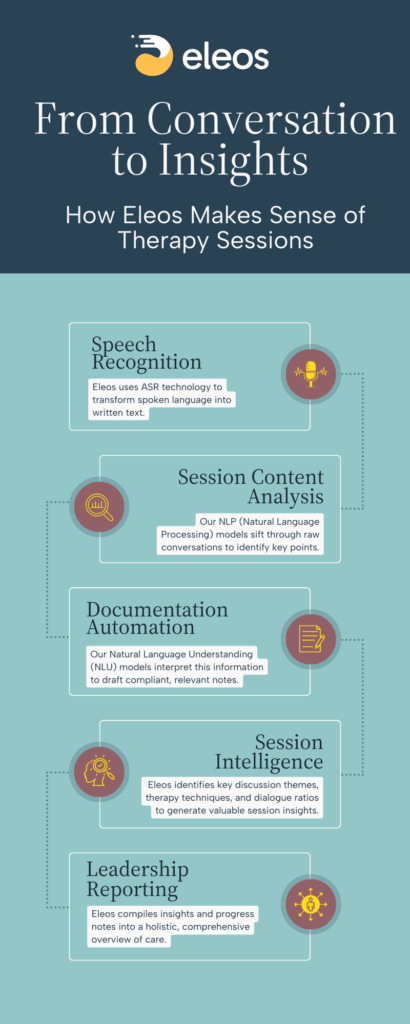
How does AI-powered documentation work when audio is not available?
In some cases, audio from the therapy conversation is not available for the AI to analyze. Maybe the conversation occurred in a setting where there was no internet access. Or, perhaps the client was not comfortable using the ambient AI technology.
For these situations, Eleos offers a text summary option where the provider simply types in a few bullet points describing what happened in the session, and Eleos expands them into a full, clinically accurate, compliant progress note—which the provider can then review, edit, and finalize once they are logged back into the EHR.
The illustrations below show how Eleos works inside the EHR with either live audio capture (top) or a text-based summary (bottom). Learn more about all of Eleos’ AI-driven documentation tools here.
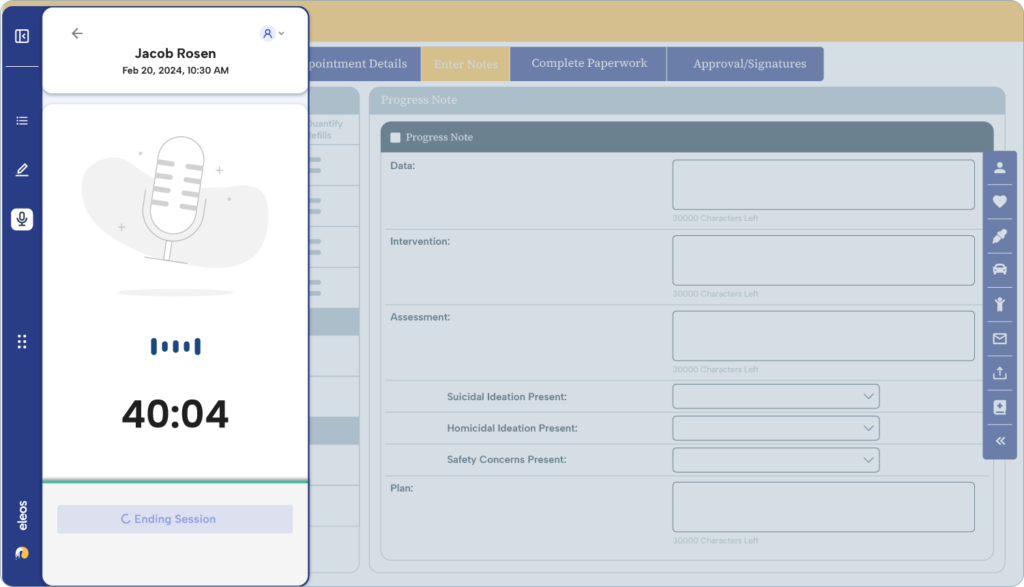
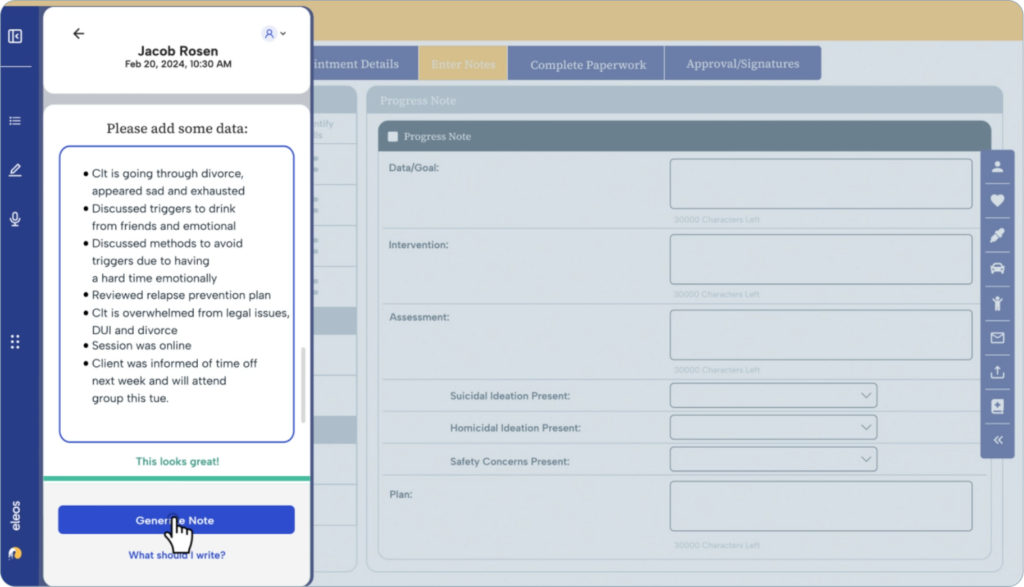
What makes documentation created by behavioral health AI different from other types of AI-generated notes?
The workflow automation found in a behavioral health-specific AI platform is fundamentally different from the “dot phrasing” technology used by some documentation assistance services. “Dot phrasing” is a digital shorthand system where typing a keyword or abbreviation preceded by a period prompts the system to automatically expand the text into a phrase or sentence.
But, it’s only that: shorthand. It’s a useful tool that can save time, but it operates based on predefined rules or templates and lacks the capacity to adapt or provide personalized insights over time. Essentially, it’s a reactive system that executes a predetermined task in response to a specific input.
Meanwhile, the true Augmented Intelligence found in the Eleos platform is designed to not only generate notes, but also delve into the clinical content of a session and pull out meaningful insights and important concepts. Rather than merely assisting in note-writing, it uses advanced machine learning algorithms to analyze data, draw conclusions, and make predictions—resulting in detailed, unique progress note suggestions.
As a proactive system, it continuously learns and refines its capabilities based on the data it processes as well as each individual user’s behavior, preferences, and note edits. It’s much more than a shortcut for documentation—it’s a tool that can potentially elevate treatment personalization, aid in clinical decision-making, and improve the quality of healthcare overall.
What is “Augmented Intelligence?”
Augmented Intelligence is a flavor of artificial intelligence (AI) that is designed to empower and enhance human capabilities—not replace them.
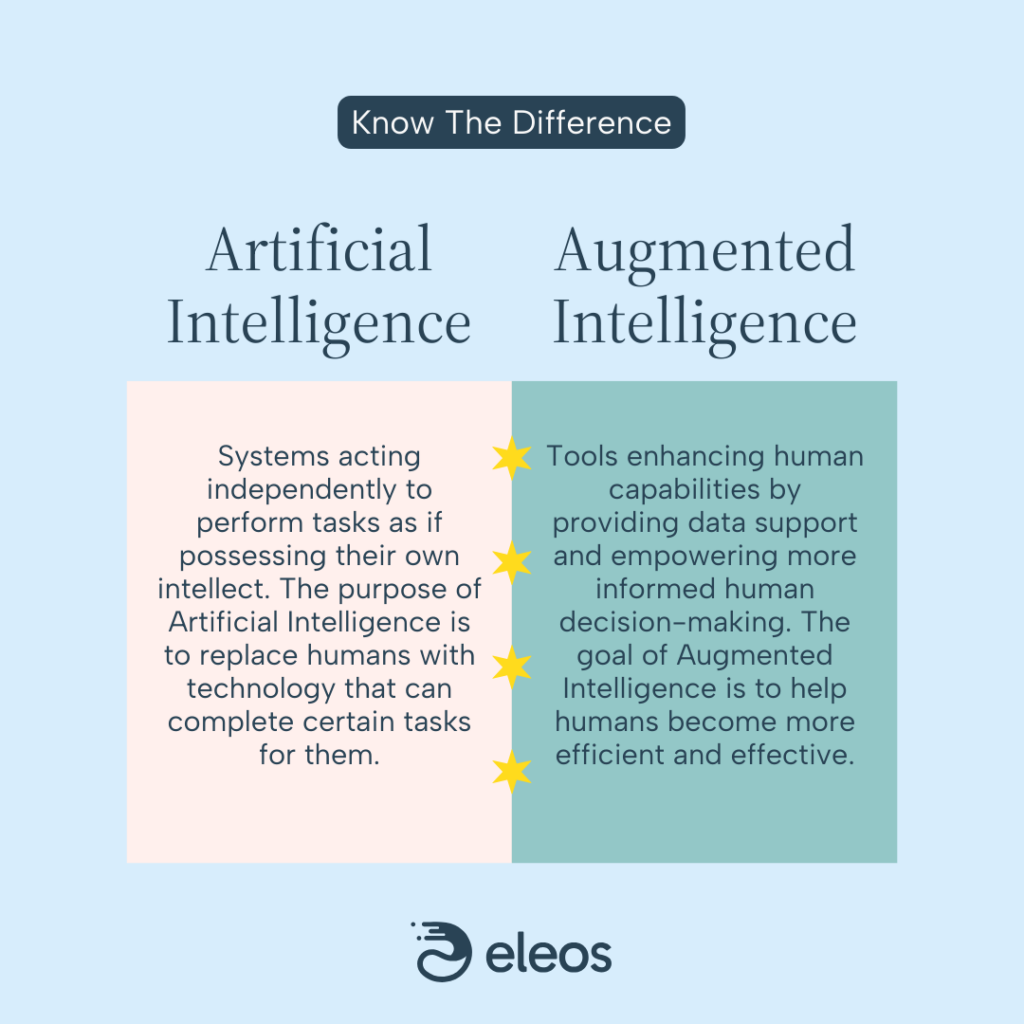
Several applications of artificial intelligence fall under the AI umbrella, and Augmented Intelligence is one specific branch that Eleos focuses on.
At its core, Augmented Intelligence is about putting human providers at the center of the AI solution. The AI isn’t there to take over, but rather to assist humans in tasks and analyses that would be inefficient or potentially impossible for them to do alone. The goal is to enrich human intelligence with the power of AI, providing behavioral health professionals with tools that enable better and quicker decision-making. This differs from other branches of AI or digital therapeutics, which aim not just to assist, but to stand in place of a provider delivering care.
You could argue that some artificial intelligence technologies fall into the “provider assistance” category. For example, if a robot can carry out the actions or recommendations a provider programs it to execute, perhaps you could say the technology is augmenting the provider’s capacity. But from the perspective of the care recipient, it’s a replacement. Their interaction is not with an actual human anymore.
Augmented Intelligence, as leveraged by Eleos, enhances the provider’s expertise and the therapeutic relationship they develop with the client—but it doesn’t carry out any treatment interventions or decisions for the provider. This thoughtful application of technology is designed to complement human capabilities, allowing providers to work more efficiently and effectively.
“If you give a mathematician a calculator, you just help them save thousands of hours calculating. In the end, they are not less of a mathematician just because the calculator is faster. It’s the same when you give AI tools to a clinician: you augment their abilities. That’s the power of human intelligence plus AI.”
-Samuel Jefroykin, Director of Data & AI Research, Eleos
How does documentation workflow automation work with existing patient record systems like EHRs?
There are two main ways a behavioral health AI tool can connect to your EHR: integration and embedding. Integration typically requires engineering teams on both sides to coordinate permissions, build APIs, and map fields. While this approach can eventually lead to effortless workflows, it often comes with long timelines, high costs, and limited flexibility—especially if your EHR templates or configurations change over time.
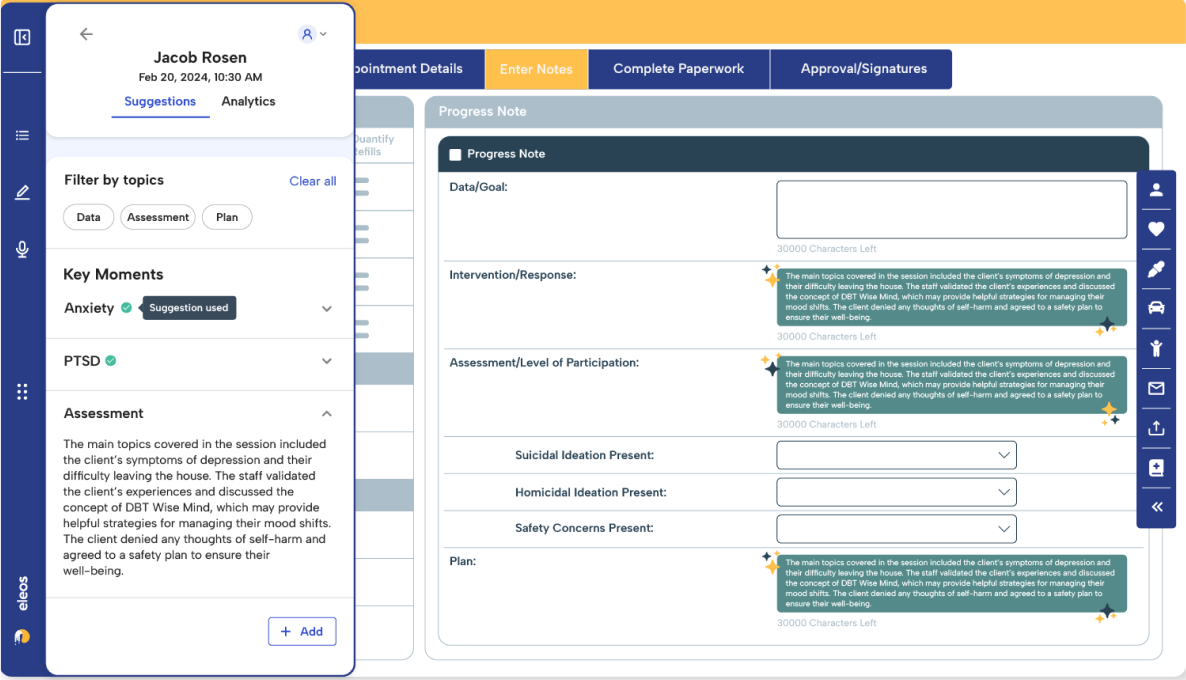
Embedding, on the other hand, offers a faster and more adaptable path. As shown in the illustration above, Eleos uses a browser extension to overlay your existing web-based EHR, allowing you to access and apply AI-generated note content within your current workflow. This means clinicians can see and edit structured suggestions inside the same documentation screen they already use, without switching between systems or reformatting content. No coding, API work, or IT lift is required.
Eleos Documentation embeds easily into web-based EHRs so it can function seamlessly within current workflows.
Worried AI might not work with your current EHR setup? Our EHR deep dive explains how different connection types work—and why overlaid AI tools are often easier to implement.
Because it’s EHR-agnostic, Eleos can work across a wide range of platforms and settings. And unlike tightly integrated tools that are difficult to migrate or adapt, embedded behavioral health AI travels with you—making it easier to switch EHRs or support multiple systems across your organization.
What are the benefits of AI for behavioral health?
The benefits of automated documentation are substantial and transformative for behavioral health clinicians and their employers. A purpose-built behavioral health AI platform:
- Reduces Time Spent on Admin Work: Eleos automatically generates over 80% of the progress note, significantly reducing the administrative burden on clinicians and helping them decrease documentation time by 70% or more.
- Supports Compliance Requirements: Ease of documentation and compliant progress note suggestions help reduce unbilled activities and overall compliance risk. Providers who use Eleos complete 90% of notes within 24 hours of the session—with some organizations reporting submission times as low as 4.4 hours. This helps prevent claim issues and denials, protecting the financial health of healthcare organizations.
- Reduces Provider Stress: 90% of providers who use Eleos report feeling less job-related stress, ultimately bolstering staff morale, supporting recruitment and retention efforts, and improving care quality.
- Improves Accuracy: By leveraging AI and advanced NLU models, Eleos generates accurate, session-specific, clinically detailed documentation—reducing the likelihood of data entry errors or “copy-paste” notes. A recent study showed that Eleos Health’s ML models were highly effective at detecting evidence-based techniques within a therapy session.
These benefits, supported by concrete evidence, show the transformative potential of AI and Augmented Intelligence in the behavioral healthcare sector—particularly in streamlining documentation and alleviating clinician burnout.
Improve Patient Care with Session Intelligence and Leadership Reporting
In the world of behavioral health, achieving a consistent standard of care has always been a key challenge. Factors contributing to this challenge include:
- Variations in treatment approaches
- Lack of transparency into session dynamics
- Inconsistent efforts to enhance care quality by individual clinicians
It’s a complex landscape that requires a creative solution, and Eleos has delivered on that requirement with two sophisticated features: Session Intelligence and Leadership Reporting.
What is Session Intelligence?
Session Intelligence is a feature that uses Augmented Intelligence to generate comprehensive insights for individual therapy sessions. Clinicians can analyze a plethora of vital information, such as talk-versus-listen ratios, application of therapeutic techniques, care trends over time, and patient-reported outcomes. By providing greater transparency into session happenings, Session Intelligence helps drive improvements in care quality at the provider level.
What does a Session Intelligence summary include?
From a user perspective, Session Intelligence is delivered as a convenient dashboard offering a comprehensive overview of a care session (as shown in the illustration below). Within roughly two minutes of the session’s conclusion, it presents talk-versus-listen ratios, keywords, themes, and information on the usage of evidence-based techniques. Session recordings and transcripts, as well as supervisor comments, are also available in cases where the client has provided explicit consent.
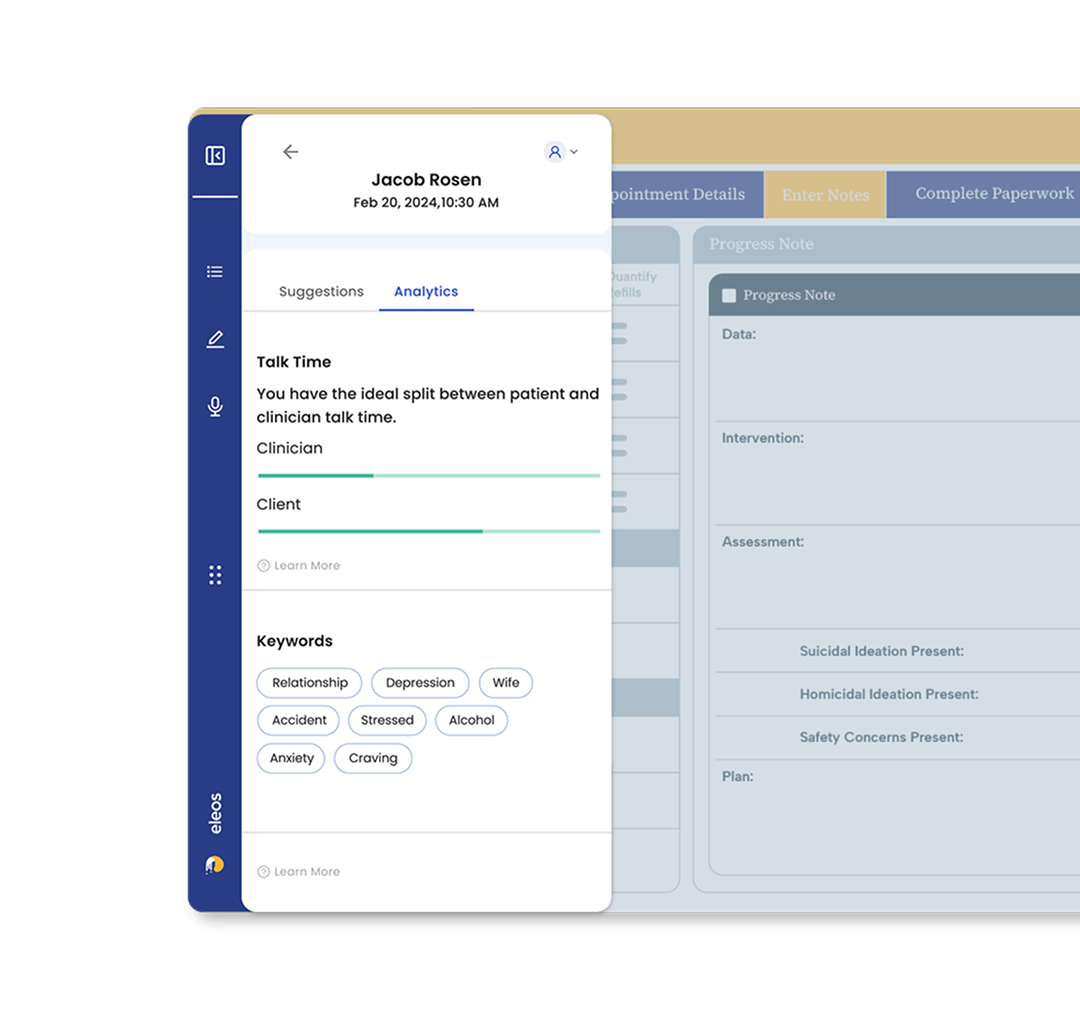
From an AI perspective, Session Intelligence creates detailed, intuitive session summaries by turning narrative, unstructured session data into structured data and analysis. The aim is to offer an objective view of what transpired during the session—beyond what is possible with traditional provider-authored notes. The system identifies techniques the provider used and the client’s responses, silences, and talk times—among other things. These insights offer an in-depth understanding of what the clinician did during the session and how the patient is progressing through treatment.
What is Leadership Reporting?
With Leadership Reporting, Eleos further supports healthcare organizations by equipping supervisors and leaders with comprehensive, real-time visibility into staff activity, caseloads, and performance. In addition to providing insight into key population health metrics and trends, this type of reporting highlights areas for improvement and enables targeted provider training and development.
How do Session Intelligence and Leadership Reporting drive more efficient and effective care?
In the past, providers seeking to improve their clinical skills were limited to engaging in self-led learning, relying on their memories to have discussions with leaders or mentors, or undergoing direct observation from a supervisor. Now, Session Intelligence empowers them to evaluate their practice with concrete data, leading to significant improvements in care quality, efficiency, and outcomes. Meanwhile, Leadership Reporting offers organizational leaders an added layer of intelligence for strategic planning and oversight.
Together, these two types of advanced intelligence can transform the entire care experience. In fact, providers using Eleos have been shown to double client engagement, achieve 3–4x better client symptom reduction, and use 35% more evidence-based techniques. As a result, organizations see fewer no-shows with clients attending 67% more sessions when their clinician uses Eleos.
To learn more about all the ways purpose-built AI helps elevate care standards at scale, check out this podcast episode.
Strengthen Compliance with Automation
While clinicians and clients are the face of the behavioral health space, there’s also a large (and often overlooked) network of people working behind the scenes to keep all moving parts in check. Supervisors, administrators, and Continuous Quality Improvement (CQI) teams are responsible for a daunting task: overseeing clinical note compliance to reduce the risk of audits, clawbacks, and denials.
The scale of this task is tremendous, especially for larger organizations. Given the volume of clinical notes generated each day, it’s rarely feasible to review everything manually. Still, without a reliable method for reviewing documentation at scale, organizations are vulnerable to financial and regulatory liabilities.
Learn how GRAND Mental Health and Merakey Audit 20x more progress notes internally with Eleos Compliance. See the case study.
What kind of compliance support does behavioral health AI provide for clinicians and supervisors?
Eleos Compliance is an AI-powered tool that supports compliance efforts across the full documentation lifecycle. While Eleos Documentation is optimized to generate compliant note suggestions that are always unique to the session being documented, Eleos Compliance reviews the resulting notes after finalization to identify vague or missing content, flag copy-paste language or sparse sections, and highlight gaps in the “Golden Thread” (i.e., the connection between treatment goals, interventions, and outcomes).
Eleos Compliance also checks for documentation of medical necessity, action planning, and client progress, so it’s easy to ensure notes are accurate, defensible, and aligned with billing requirements. Additionally, with Eleos, most notes are completed and submitted within 24 hours, which reduces the risk of late filing, unbilled sessions, and clawbacks.
For supervisors and CQI teams, Eleos Compliance provides a centralized dashboard (shown in the illustration below) that offers visibility into documentation patterns across the organization. Each note is scanned using a six-point compliance analysis to assess areas like cloned content, missing interventions, lack of progress mentions, and treatment plan alignment. Teams can quickly identify trends, prioritize training needs, and spot documentation that may be at risk of denial or corrective action. By replacing manual review with automated compliance analysis, organizations can better protect their revenue, reduce administrative burden, and strengthen clinical documentation integrity at scale.
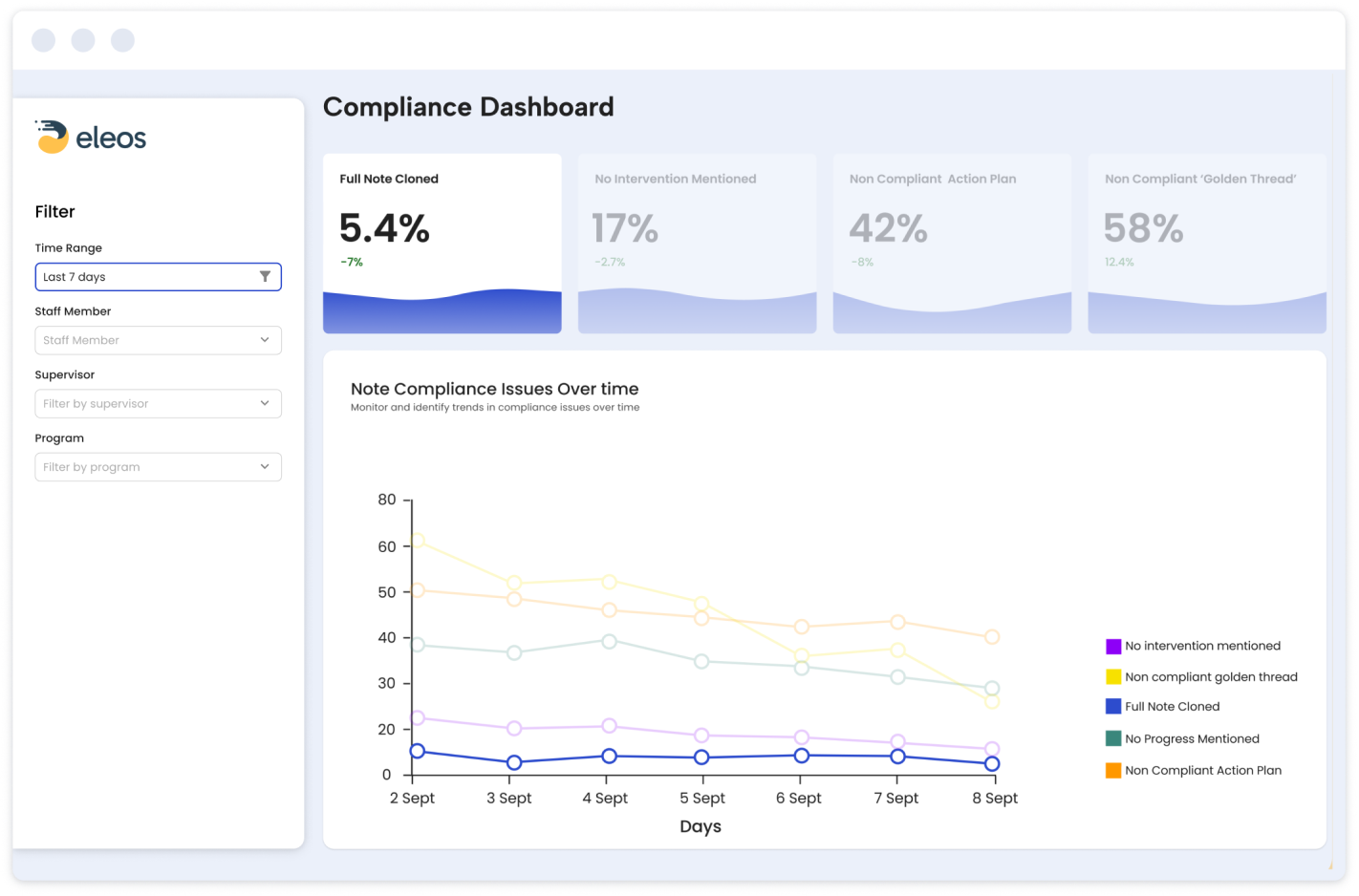
Want to see how AI can improve compliance while reducing workload? Request a demo to see how Eleos reviews every note, supports CQI teams, and helps reduce risk—no manual review required.
The Expanding Role of AI in Behavioral Health
Thanks to behavioral health AI, the manual, labor-intensive processes of the past are steadily being replaced by new systems that leverage automation, intelligence, and data-driven insights to elevate care effectiveness and efficiency. Platforms like Eleos are pioneering this shift, making workflow automation for behavioral health a critical component of modern care operations.
AI brings significant value to behavioral health organizations in three pivotal areas: documentation, session intelligence, and compliance. By automating and enhancing these aspects of care operations, organizations will not only improve care quality and streamline organizational efficiency, but also help ensure regulatory compliance. The ultimate benefit? Freeing clinicians to focus more on their primary mission of delivering exceptional care—rather than getting buried in a pile of time-consuming administrative tasks.
At Eleos, we believe that the future of behavioral health isn’t one where therapists are replaced by robots. Instead, the future will bring widespread adoption of intelligent technology to enhance the crucial human element of behavioral healthcare. In the behavioral health AI future, clinicians spend less time on paperwork and more time doing what matters most: helping people live better, fuller lives.
Ready to see what AI can do for your organization? Request a demo of Eleos’ specialized AI software here.

